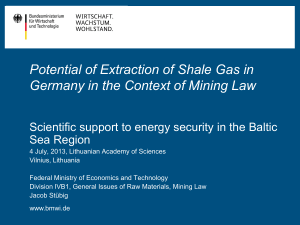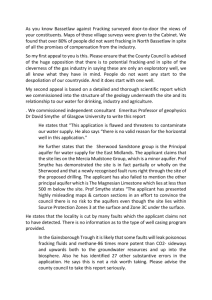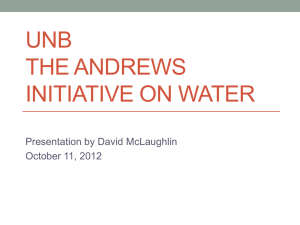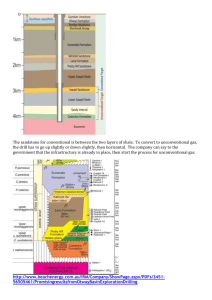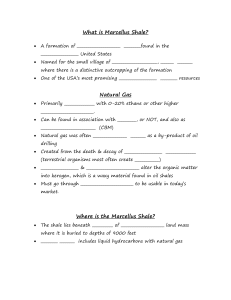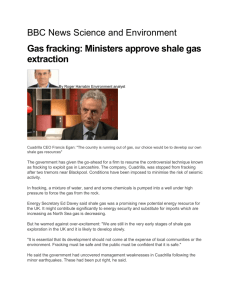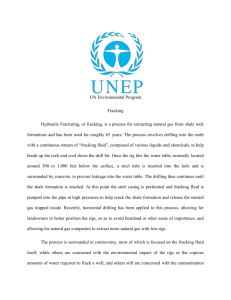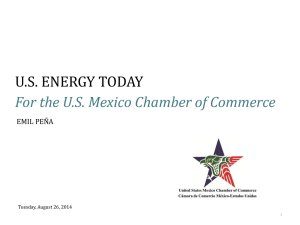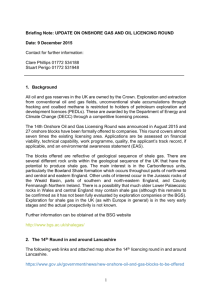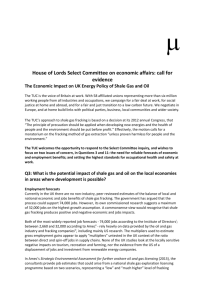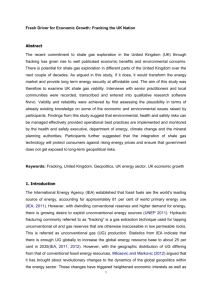Shale gas in the UK - APPG Unconventional Oil and Gas
advertisement
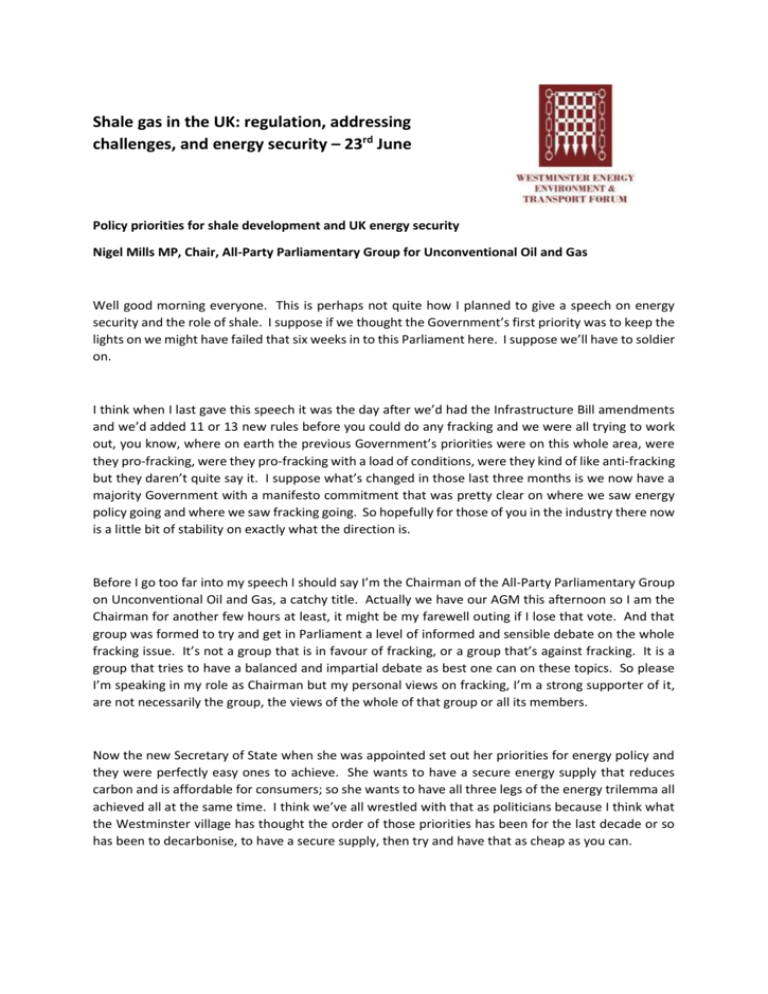
Shale gas in the UK: regulation, addressing challenges, and energy security – 23rd June Policy priorities for shale development and UK energy security Nigel Mills MP, Chair, All-Party Parliamentary Group for Unconventional Oil and Gas Well good morning everyone. This is perhaps not quite how I planned to give a speech on energy security and the role of shale. I suppose if we thought the Government’s first priority was to keep the lights on we might have failed that six weeks in to this Parliament here. I suppose we’ll have to soldier on. I think when I last gave this speech it was the day after we’d had the Infrastructure Bill amendments and we’d added 11 or 13 new rules before you could do any fracking and we were all trying to work out, you know, where on earth the previous Government’s priorities were on this whole area, were they pro-fracking, were they pro-fracking with a load of conditions, were they kind of like anti-fracking but they daren’t quite say it. I suppose what’s changed in those last three months is we now have a majority Government with a manifesto commitment that was pretty clear on where we saw energy policy going and where we saw fracking going. So hopefully for those of you in the industry there now is a little bit of stability on exactly what the direction is. Before I go too far into my speech I should say I’m the Chairman of the All-Party Parliamentary Group on Unconventional Oil and Gas, a catchy title. Actually we have our AGM this afternoon so I am the Chairman for another few hours at least, it might be my farewell outing if I lose that vote. And that group was formed to try and get in Parliament a level of informed and sensible debate on the whole fracking issue. It’s not a group that is in favour of fracking, or a group that’s against fracking. It is a group that tries to have a balanced and impartial debate as best one can on these topics. So please I’m speaking in my role as Chairman but my personal views on fracking, I’m a strong supporter of it, are not necessarily the group, the views of the whole of that group or all its members. Now the new Secretary of State when she was appointed set out her priorities for energy policy and they were perfectly easy ones to achieve. She wants to have a secure energy supply that reduces carbon and is affordable for consumers; so she wants to have all three legs of the energy trilemma all achieved all at the same time. I think we’ve all wrestled with that as politicians because I think what the Westminster village has thought the order of those priorities has been for the last decade or so has been to decarbonise, to have a secure supply, then try and have that as cheap as you can. I think the clear priorities of my constituents are probably the reverse of that. They want it as cheap as they can have it, they’d like it to be secure so they know the lights’ll come on and if they can get both of those they’d like it to be as green as it possibly can be. And I think we humble non-experts on this would probably say it’s pretty hard to have all three of those, it’s hard to see actually how you decarbonise at a very great speed and keep bills down because the cheapest forms of energy are not the cleanest forms. So I suppose it’d be interesting to see how the Government move on and try and achieve all those three things at the same time. We saw a big announcement yesterday, or last week, with a statement in Parliament yesterday about ending support for onshore wind. I think the right thing to do, I think a popular thing to do amongst people who have had wind farms proposed in their areas. But that new condition that was put in there that these things can only go forward if they have local support. And exactly how you define local support, that might be relevant for the shale gas debate because we know the Conservative party manifesto in our Government policy sets out that they do want to have community buy-in for shale gas fracking projects, you need that community fund at a level that wins support. Exactly how you achieve that, I mean I think my own experience as a constituency MP I have had an application for a solar panel farm, I’ve had an application for an incinerator, I’ve had wind turbines, I’ve had open cast coal mines. I can tell you none of those have any local support anywhere around where those sites are going to be. You think solar panels would be relatively quiet and unobtrusive, they were absolutely loathed by the people that lived around that proposed site. So how you’re ever going to get local support for any kind of energy infrastructure project I suspect is quite hard. And I think we have to take that in context as politicians. Actually if you ask people individually on any application, chances are no-one near it will like it. If you ask people what they think their priorities are for the country you’ll get a slightly warmer reception and I think fracking and shale gas and the like don’t have particularly strong polling. But I suspect most people out there probably don’t want anything near them but want everything somewhere else so they can have cheap energy when they need it. It’s how we take people with us but there are certain things that need to be done for national infrastructure that have to go somewhere and sadly in this case the somewhere is near where you are and it’s how best we compensate them and try and take them with us in that debate rather than losing them from the outset. It strikes me it’s pretty clear that gas will have to form a large part of our energy generation sources for a very long period. I think we know we’re on track to hit our 20% of electricity through renewable targets by 2020 and there’s no doubt we can find more and more ways of generating electricity through renewables. The Government have announced the Swansea Bay project, there’s more offshore wind coming, there’s more solar panels the Government are committed to. But no-one’s quite worked out yet how on earth we tackle heating houses which are predominantly done by natural gas if we want to start decarbonising that. So I suspect if you really… if the Government are committed to having secure, clean and cheaper energy, gas is going to be the single largest part of that. If the current Government are committed to taking coal out of the supply in the relatively short term so there will be a large amount of gas, I think that is where the opportunity is for shale gas to give us a new domestic source of gas as the North Sea starts to decline or keeps on declining. And also I think you’ve heard from other speakers it’s not particularly clear yet how much shale gas we can extract or how much there is there and how viable that’s actually going to be, but as a set of Government priorities to have a domestic source of gas that we can exploit where we have the security of supply in the UK, we’re not reliant on Mr Putin or the Middle East for large chunks of energy at least as far as we can get, and we’re not totally exposed to market price fluctuations perhaps in the way you are if you’re importing. To have that security and to have the very large amounts of domestic jobs that the various studies show could be created by having a thriving shale gas sector, I think Ernst and Young said there’s 64,000 jobs and 33 billion economic benefit. So I think you can see why the Chancellor in his first outing at Prime Minister’s questions last week had a question there on how we exploit shale gas and he was very clear he wanted to see shale gas being exploited, he wanted to find a way of the community funds and compensation being there but it needs to be in a safe way that people can have confidence in. And I would say as a humble backbench politician to those of you in the industry, the key thing for the long term future of the shale gas industry and fracking in the UK is that as you start getting permissions as I think you will, any more cock-ups on it will be a very big problem. This has to be done safely, it has to be done cleanly, it has to be done responsibly. All the rules have to be complied with. There will be scarceless, there will be people out there who have very real and reasonable concerns about this but we absolutely have to show that the controls that are put in place, the environmental protections, the rules on responsible operating, that you guys do comply with them all. Because if you don’t and it goes wrong, there will be no political backing for this industry, you know, that will become a political impossibility. So that will be, I suspect, a policy challenge for us is to put in place a sufficiently robust framework that we can have confidence in, that we can sell to our constituents, that they can have confidence in, then that has to be made to work for the long term future of the industry. We can’t have any of those horrific disasters the US had which will shatter any further confidence in this. But as I say, I think the prize that’s out there if we can make shale gas work in terms of jobs and security of energy supply and contributing to that and meeting the impossible trilemma that actually does make it worth proceeding with, but we have to get it right, otherwise I’m afraid it will be one of those industries that starts in infancy and doesn’t get any further than that. That was about all I can read of my speech on my iPad without being able to read all the detailed notes, but I’m here for the panel of questions later on so thank you everybody. Professor Mike Stephenson: Nigel Mills MP: Of course. Thank you very much. Do you mind answering some questions now?

